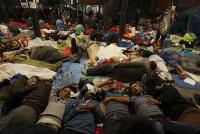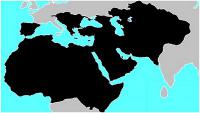-
Napolitano, Chertoff: it is possible to welcome Syrian refugees, protect U.S. security

Two former secretaries of the Department of Homeland Security — Janet Napolitano (2009-13) and Michael Chertoff (2005-9) — wrote to President Barack Obama Thursday, saying it is possible to welcome refugees while ensuring the safety and security of Americans. “The [vetting] process that is currently in place is thorough and robust and, so long as it is fully implemented and not diluted, it will allow us to safely admit the most vulnerable refugees while protecting the American people. Fortunately, these goals are not mutually exclusive,” the two former secretaries write.
-
-
DHS seeking faculty, students for summer 2016 research programs
The U.S. Department of Homeland Security (DHS) is seeking faculty, undergraduate, and graduate students interested in participating in one of its 10-week programs in summer 2016, including its Summer Research Team Program for Minority Serving Institutions and its Homeland Security — Science, Technology, Engineering and Mathematics (HS-STEM) Summer Internship Program. The deadlines for applying for both programs occur in December 2015.
-
-
170 hostages held in Mali’s capital
About ten gunmen, reported to be speaking English, early Friday morning stormed and took control over a luxury hotel in Bamako, Mali’s capital. Reports from the Mali security forces and hotel guests speak of three people who were killed and about 170 being held hostage by the terrorists. About eighty guests managed to leave the hotel – they either escaped, or were released by the attackers after proving they were Muslim by citing passages from the Quran.
-
-
House votes for an effective ban on Syrian refugees coming to U.S.
The House of Representatives on Thursday overwhelmingly approved a bill which slows down, if not blocks altogether, the resettlement in United States of refugees from Syria and Iraq. Breaking with their president, dozens of Democrats joined all the Republicans present to pass a bill which requires the directors of the FBI and national intelligence personally to approve the acceptance into the United States of each refugee.
-
-
Trump: Muslim Americans may be required to carry special ID noting their religion
Donald Trump said he would not rule out entering all Muslim Americans in a database or giving them “a special form of identification that noted their religion.” Trump told the interviewer that he would consider warrantless searches of Muslims and increased surveillance of mosques. “We’re going to have to do things that were frankly unthinkable a year ago,” Trump said.
-
-
Encryption firm tightens access following Paris attacks
Encrypted communications specialist Silent Circle, after learning that ISIS was recommending two of the company’s products — the encrypted Blackphone handset and Silent Phone applications for private messaging — to the organization’s followers, is taking steps to make it more difficult for terrorists and their followers to use these products.
-
-
Telegram IM app recalibrates policies after Paris attacks
Pavel Durov, the creator of the popular instant messaging app Telegram, has said that following the Paris terrorist attacks, his company has blocked dozens of accounts associated with the jihadist Islamic State group. As is the case with other technology companies, Telegram is trying to negotiate the balance between privacy and security: the same privacy-enhancing technology which keeps customers’ communication private, also helps terrorists communicate with each other and plot attacks safe from monitoring and surveillance by intelligence agencies and law enforcement.
-
-
“Iconic” El Niño may bring more than rain to California
A few weeks ago in the hills north of Los Angeles, heavy rain set off widespread mudslides that blocked roads and covered highways, burying hundreds of vehicles and bringing much of Los Angeles’ infamous traffic to a standstill. For Californians, these mudslides are just one of many recent harbingers signaling the imminent arrival of a “monster” El Niño — an El Niño that started bubbling up from unusually warm temperatures in the tropical Pacific last summer. In Southern California, a strong El Niño usually signals rain, and given that California is now in the throes of a severe drought, it seems like that should be a good thing, even if it comes with risk of floods. But the reality of climate is more complex and counter-intuitive than it first appears, and Californians should be careful what they wish for.
-
-
Body of Paris attacks' mastermind identified
The French prosecution has just announced that forensic evidence confirms that Abdelhamid Abaaoud, the 27-year old Belgian who was the mastermind of Friday’s attacks in Paris, was killed in Wednesday’s police raid on an apartment building in St.-Dennis. Abaaud’s 26-year old cousin killed herself by exploding a suicide vest, and the police now say that there may be a third body under the rubble of the partially collapsed third floor of building.
-
-
Teenager who used student loan to fly to Syria to join ISIS sentenced to five years in jail

Yahya Rashid, 19, described by the British police as a street-smart teenager who conned his way into university and then spent his student loan on a trip to Syria to join ISIS, has been sentenced to five years in jailed. Rashid used a forged documents to gain acceptance to Middlesex University, and received £6,326.96 in student loans. He used the cash to buy five plane tickets for a trip to Turkey on 26 February so he and four friends could cross into Syria and join ISIS.
-
-
Why jihadism appeals to religiously illiterate loners
Many of the jihadist killers, as they shoot their innocent victims, invoke God with the Arabic phrase “Allahu Akbar.” Indeed, this otherwise innocuous everyday religious utterance is frequently usurped as a jihadist battle cry. But those drawn to jihadism are usually not particularly religious prior to their involvement with violence. They are either raised in largely secular households or possess only a rudimentary grasp of their parental faith, which rarely extends to religious practice of any sort. It is not to exonerate religion in any sense to say that for many French Muslims, whose life in the banlieues consists of not much more than a mix of unemployment, crime, drugs, institutional racism, and endemic cycles of poverty and disenfranchisement, jihadism potentially offers a way out of the banal and inane drudgery of daily life. In direct contrast to feelings of boredom, purposelessness, and insignificance, the jihadists offer redemption through the image of the chivalrous warrior, recast as some sort of avenging hero.
-
-
Virginia mayor says WWII Japanese internment “inspires” his policies toward Syrian refugees

Roanoke, Virginia, mayor David Bowers (D) got into hot water on Wednesday when he issued a statement citing the U.S. internment of Japanese during the Second World War as an inspiration for his decision to delay assistance to Syrian refugees. Roosevelt, in the name of national security, ordered the forcible relocation of more than 100,000 Japanese immigrants and Japanese-Americans living in the United States to internment camps for more than three years. The internment is regarded as one of the most serious civil-liberties violations committed by the U.S. government.
-
-
Iran began dismantling its nuclear program, but has way to go to come into full compliance: IAEA

The IAEA says that Iran has begun dismantling parts of its nuclear program, as agreed in a deal with the P5+1 powers – but that it has some way to go before coming into full compliance with the agreement. Iran has removed 4,500 centrifuges from the Natanz and Fordo site – but it has to remove 10,000 more before 15 December. Iran has added 460 kg low-enriched uranium to its stock – it now has 8.3 tons of low-enriched uranium – but that stock must be slashed to just 300kg by 15 December. If Iran does not meet in full these, and other, clauses in the agreement by 15 December, the economic sanctions will not be lifted.
-
-
Fate of suspected mastermind of Paris attacks still unclear
The fate of Abdelhamid Abaaoud, the mastermind of Friday’s attacks in Paris, is still unclear after a massive early morning raid by the French police on an apartment building in the Paris suburb of Saint-Dennis. The Washington Post reported that the 27-years old Belgian of Moroccan origins was one of the two people killed in the raid, but other news outlets in France and the United States – including all leading French media — report that Abaaoud’s fate is unknown. The French authorities say that forensics experts have been combing the partially destroyed, seeking DNA and other evidence. Since the Friday attacks, the French police have launched 414 raids on sites where terrorists and terrorist supporters were suspected to be hiding.
-
-
2 dead, 7 arrested in French police raid on apartment building in search of attacks’ mastermind
About 200 members of the special units of the French police early Wednesday morning (Paris time) swooped on the Parisian banlieue, or suburb, of Saint-Denis – where the Stade de France, one of the sites of Friday’s terrorist attacks, is located – and arrested seven people. Two people were killed. One of the dead was a young woman who blew herself up with a suicide vest. French Prosecutor Francois Molins told reporters that the operation was a result of a credible tip — in all likelihood, a police informer who resides in the neighborhood — suggesting Abdelhamid Abbaaoud, a 27-year-old Belgian of Moroccan origin, was holed up in an apartment in a residential building.
-
More headlines
The long view
What Does Netflix’s Drama “Adolescence” Tell Us About Incels and the Manosphere?
While Netflix’s psychological crime drama ‘Adolescence’ is a work of fiction, its themes offer insight into the very real and troubling rise of the incel and manosphere culture online.
A Shining Star in a Contentious Legacy: Could Marty Makary Be the Saving Grace of a Divisive Presidency?
While much of the Trump administration has sparked controversy, the FDA’s consumer-first reforms may be remembered as its brightest legacy. From AI-driven drug reviews to bans on artificial dyes, the FDA’s agenda resonates with the public in ways few Trump-era policies have.
The Center Can Hold — States’ Rights and Local Privilege in a Climate of Federal Overreach
As American institutions weather the storms of executive disruption, legal ambiguity, and polarized governance, we must reexamine what it means for “the center” to hold.
How to Reverse Nation’s Declining Birth Rate
Health experts urge policies that buoy families: lower living costs, affordable childcare, help for older parents who want more kids
Foundation for U.S. Breakthroughs Feels Shakier to Researchers
With each dollar of its grants, the National Institutes of Health —the world’s largest funder of biomedical research —generates, on average, $2.56 worth of economic activity across all 50 states. NIH grants also support more than 400,000 U.S. jobs, and have been a central force in establishing the country’s dominance in medical research. Waves of funding cuts and grant terminations under the second Trump administration are a threat to the U.S. status as driver of scientific progress, and to the nation’s economy.
The True Cost of Abandoning Science
“We now face a choice: to remain at the vanguard of scientific inquiry through sound investment, or to cede our leadership and watch others answer the big questions that have confounded humanity for millennia —and reap the rewards.”
